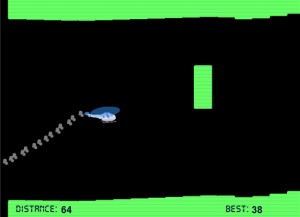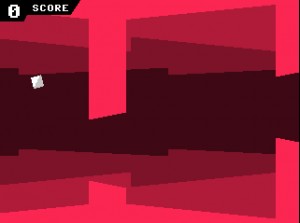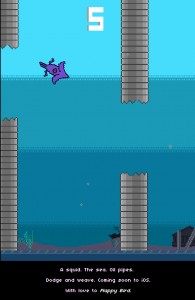Indie Rock: Flappy Bird Clones
- Updated: 19th Feb, 2014

I have had the most doubts about my usefulness as a professional gaming media enthusiast this week. More so now than during the eight years of education it took to gain the skills, cardiovascular endurance and take the necessary examinations to gain my criticism licence.
Flappy Bird has been the focal point of all this introspection.
Fucking Flappy Bird.
My little sister sent me a text last month. She wished me a happy chinese new year. I asked her who she was. We’re very close.
She asked if I’d written a review of Flappy Bird. I didn’t know what it was at the time. Now it’s almost too late for the information to matter. It was a fiendishly difficult iOS app which became an overnight sensation. It was accused of theft, both of idea cloning and copying aesthetics from Mario. In direct response to the game’s abundant popularity the creator realised he had accidentally made something too addictive and took the game down from the iPhone App Store so that he could continue to live with himself.
And my sister knew about it before I did. Are you trying to replace me, Lily? Do you know what I went through to get here? You wouldn’t last a day covering gamescom. You wouldn’t be able to eat any of the food because of your staunch vegetarianism and you haven’t built up the inhuman tolerance for alcohol necessary for a night of networking. Come back when you’re not 11 and we’ll see which one of us is the most qualified to know about children’s video games.
It’s impossible to play the original Flappy Bird unless you’ve already downloaded it. It’s a shame, because it’s a well designed little… thing. You are a bird and you try to get in between pipes acting as barriers. The arc of your jump height is set at such a specific climb that you need to be precise to ensure your success.The difficulty feels tuned such that your inability to play well is more your fault than the games limited input.
When you inevitably misjudge the timing you feel as if you made the wrong decision to flap to gain height rather than waiting slightly. I’d compare it so Dark Souls, not just because it’s tough and there’s a learning curve, but the two share an insistence that performing an action means that you’re prepared to see it through to its completion rather than being able to cancel out of it.
 The idea of moving to the right and being very specific about your placement in the level isn’t new. It follows on from a much older game called Helicopter, which also sees you travel to the right and fit through spaces but the input is almost the reverse. In Helicopter it’s too difficult to regain your altitude and your input creates such a minor change in your climb without being sustained. In Flappy Bird you climb too immediately and have to be far more precise about your action.
The idea of moving to the right and being very specific about your placement in the level isn’t new. It follows on from a much older game called Helicopter, which also sees you travel to the right and fit through spaces but the input is almost the reverse. In Helicopter it’s too difficult to regain your altitude and your input creates such a minor change in your climb without being sustained. In Flappy Bird you climb too immediately and have to be far more precise about your action.
A conversation surrounding the game has been about where cloning ends and where the logical continuation of an existing idea starts. Flappy Bird doesn’t copy Helicopter, no more so than Helicopter copied moving to the right from Mario, but all of these games absolutely had design principles informed by each other’s existence.
It’s been interesting to see the game design community’s response to Flappy Bird’s removal, because many creators seem set out to challenge the common perception that design ideas can’t be iterated on in order to produce entirely different results. A “Flappy Jam” was organised in order to produce, ostensibly, “clones” which would replace the hole the bird-shaped application has left in the video-gaming ecosystem.
Maverick Bird
Maverick Bird is a “Fuck You” to the suggestion that incremental design is the same as cloning. It is informed by Flappy Bird’s commitment to large upward momentum, but adds the ability to cancel out of your movement with a different button press. That’s, literally, an utter gamechanger.
 It then adds different patterns which require even more precise input and memorisation, increasing the skill ceiling even higher. It’s what you’d expect from the creator, who produced the goddamned excellent Super Hexagon.
It then adds different patterns which require even more precise input and memorisation, increasing the skill ceiling even higher. It’s what you’d expect from the creator, who produced the goddamned excellent Super Hexagon.
Flappybalt
Now a “Flappy Bird-Like” doesn’t even have to involve constantly travelling to the right any more. In Flappybalt you change direction when you hit a wall. At the same time a spiked panel on the other side randomly changes position, meaning you’ve only a few moments to adjust your relative position before crashing into it and resetting. You can’t fall too far, nor climb too high either.
Floaty Squid
In this one, the pipes change position! And you’re a squid instead!
I don’t think this one actually gets it right, though. The jump height is too minimal and it makes the entire thing too easy. Honestly, there’s an art to designing a Flappy Bird game which makes it feel challenging but fair and Floaty Squid just doesn’t get there.


Follow Us!